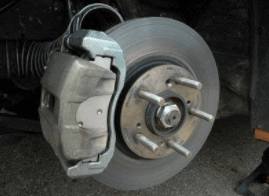As a vehicle owner you may be more familiar with the functioning and value of vehicle brake pads and rotors since they require regular and frequent replacement. However, you may not be as familiar with brake calipers and their purpose for a vehicle.
In this article, we’ll offer answers to questions like what are brake calipers, what do they do, how often do they need to be changed and what are some of the tell-tale signs of a bad brake caliper?
Who Do I Need New Brake Calipers For My Car In Fairfax, VA?
Brake calipers are a part of your braking system that’s crucial for proper functioning of your brakes. Calipers are found on each wheel and work to squeeze the brake pads against the rotors in an effort to slow the spin of the wheel and get the vehicle to reduce its speed.
Brake caliper life can vary significantly depending on how you drive and the climate you live in, which is why automakers usually avoid making replacement recommendations at specific intervals. Generally, it’s not uncommon for calipers to last up to 100,000 miles or 10 years.

4 Signs Of A Bad Brake Caliper
We understand that the recommendation of brake caliper replacement between 100,000 miles or up to 10 years is pretty broad, so here are 4 signs that it might be time to replace your brake caliper.
1) Your Vehicle Pulls To One Side – A caliper that’s binding up and not releasing can cause brake pads to drag and cause your vehicle to pull to one side. When you apply your brakes, your vehicle might pull noticeably toward the “good” side where grip is stronger. Release the brake pedal and you might notice a pull back towards the “bad” side, that’s still gripping because it hasn’t released.
2) Uneven Pad Wear – If your vehicle has a floating style caliper, rusty or worn slides or bushings may prevent the caliper from moving freely. This will prevent proper contact and will likely result in excessive and uneven wear of outer brake pads.
3) Brake Fluid Leakage – Brake fluid will eventually cause the rubber seals and boots around the caliper pistons to deteriorate and leak. Depending on how bad a leak is, the affected caliper may or may not suffer from reduced braking pressure at that wheel – even if the pistons themselves move freely. When leakage reaches a certain point, any reduced pressure will cause the vehicle to pull away from the bad side when brakes are applied.
Please note: ANY brake fluid leak is dangerous because if enough fluid leaks out, the vehicle may completely lose its hydraulic brake system. If you notice a brake fluid leak, be sure to have your vehicle inspected as soon as possible.
4) Unusual Noise From The Brakes – If you hear any squealing or other friction related sounds from one of the wheels when brakes are NOT being applied, you’ve probably got a stuck caliper. If this is the case, the noise will probably go away temporarily during the time brakes are applied.
Insider Brake Caliper Tips:
- Replace Calipers In Pairs – Even if only the rear right caliper is bad, you should still replace both rear calipers at the same time to ensure equal and predictable performance.
- Replace Calipers When Another Service Is Being Performed – To save money on labor costs, you should have your brake calipers replaced when the brake pads and/or rotors are being replaced. Another opportunity is when brake rotors are removed to work on items behind them such as wheel hubs, bearings, axle shaft seals, or the axles themselves.
ABS Unlimited hopes this article gives you the confidence to understand the function of your vehicle’s brake calipers and the replacement warning signs to watch. If you have any questions, we welcome you to contact us.


